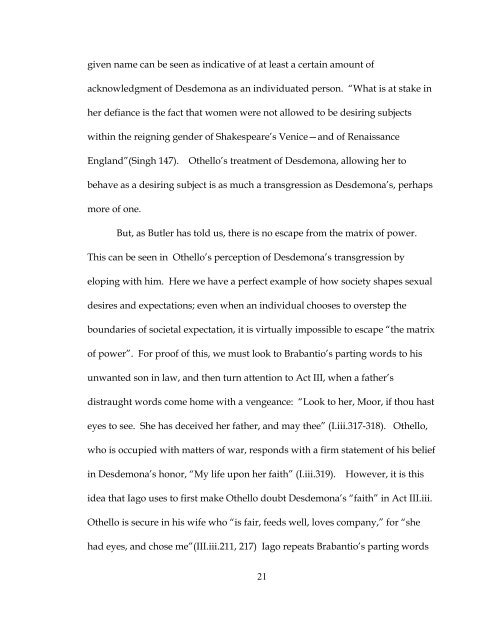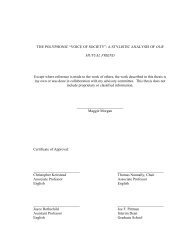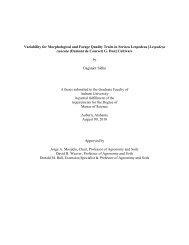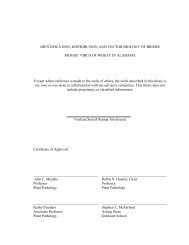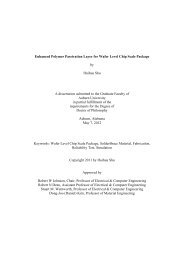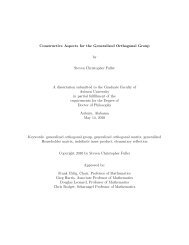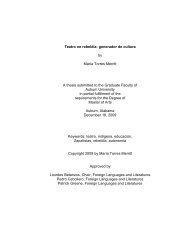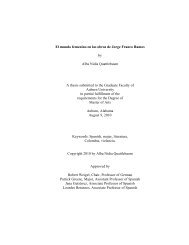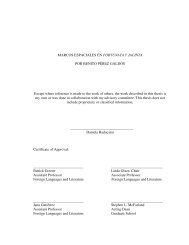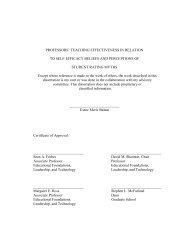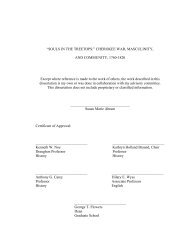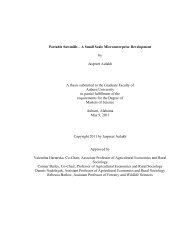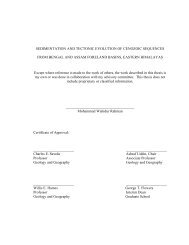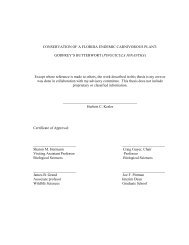the trouble with gender in othello - Auburn University Electronic ...
the trouble with gender in othello - Auburn University Electronic ...
the trouble with gender in othello - Auburn University Electronic ...
Create successful ePaper yourself
Turn your PDF publications into a flip-book with our unique Google optimized e-Paper software.
given name can be seen as <strong>in</strong>dicative of at least a certa<strong>in</strong> amount of<br />
acknowledgment of Desdemona as an <strong>in</strong>dividuated person. “What is at stake <strong>in</strong><br />
her defiance is <strong>the</strong> fact that women were not allowed to be desir<strong>in</strong>g subjects<br />
<strong>with</strong><strong>in</strong> <strong>the</strong> reign<strong>in</strong>g <strong>gender</strong> of Shakespeare’s Venice—and of Renaissance<br />
England”(S<strong>in</strong>gh 147). O<strong>the</strong>llo’s treatment of Desdemona, allow<strong>in</strong>g her to<br />
behave as a desir<strong>in</strong>g subject is as much a transgression as Desdemona’s, perhaps<br />
more of one.<br />
But, as Butler has told us, <strong>the</strong>re is no escape from <strong>the</strong> matrix of power.<br />
This can be seen <strong>in</strong> O<strong>the</strong>llo’s perception of Desdemona’s transgression by<br />
elop<strong>in</strong>g <strong>with</strong> him. Here we have a perfect example of how society shapes sexual<br />
desires and expectations; even when an <strong>in</strong>dividual chooses to overstep <strong>the</strong><br />
boundaries of societal expectation, it is virtually impossible to escape “<strong>the</strong> matrix<br />
of power”. For proof of this, we must look to Brabantio’s part<strong>in</strong>g words to his<br />
unwanted son <strong>in</strong> law, and <strong>the</strong>n turn attention to Act III, when a fa<strong>the</strong>r’s<br />
distraught words come home <strong>with</strong> a vengeance: “Look to her, Moor, if thou hast<br />
eyes to see. She has deceived her fa<strong>the</strong>r, and may <strong>the</strong>e” (I.iii.317-318). O<strong>the</strong>llo,<br />
who is occupied <strong>with</strong> matters of war, responds <strong>with</strong> a firm statement of his belief<br />
<strong>in</strong> Desdemona’s honor, “My life upon her faith” (I.iii.319). However, it is this<br />
idea that Iago uses to first make O<strong>the</strong>llo doubt Desdemona’s “faith” <strong>in</strong> Act III.iii.<br />
O<strong>the</strong>llo is secure <strong>in</strong> his wife who “is fair, feeds well, loves company,” for “she<br />
had eyes, and chose me”(III.iii.211, 217) Iago repeats Brabantio’s part<strong>in</strong>g words<br />
21


